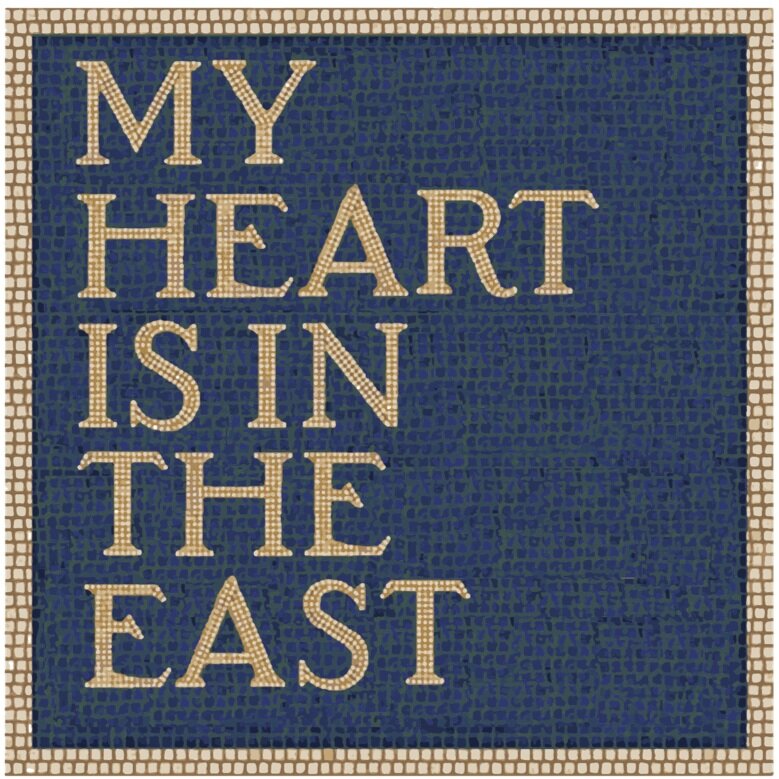The Play
In New York 2010, a Jewish American professor (Miri) receives an invitation to Basra, Iraq to lead a series of puppet building workshops. An Iraqi Muslim (Ishmael) a street poet who is currently employed as a freelance gravedigger is hired to be her translator. Their relationship is both discordant yet interdependent as they travel first to Beirut and then find themselves in the anteroom of the large poetry contest 1,000 years earlier in Cordoba, Spain. The play uses magical realism, music, puppets to carry us through time and space. At the core of the story is a rich and complex relationship between two actors, the characters they play, and the language they speak.
Since its first iteration at La Mama, New York in 2017, the work has expanded in both manpower and scope to a project that encompasses the original play and a series of educational workshops, to foster community growth and critical engagement.
Our Story
The impetus for the MHiiTE project began across a packed room of playwrights and theatre makers at The Lark international theatre laboratory in New York City in January 2015. Playwright Jessica Litwak was introducing herself, her company The HEAT Collective and her current work to the room as part of an industry session which was a feature of the Fence Network’s 20th Meeting.
London-based Fence Curator/Director Jonathan Meth was intrigued by the mention of Cordoba as both a neglected historical global centre and central metaphor for bridging difference. He wanted to hear more…An early version of the script was given a staged reading at Graeae’s space in London in August 2015, with actor Philip Arditti joining Jessica as actor-playwright - and an invited audience of 35. Jonathan wanted to involve Philip as an initial vehicle for text exploration because he is London-based and known to the director as both an excellent performer, but also an actor who would ask searching dramaturgical questions of the material. Following feedback generated by both Philip and the audience, the script was reworked by Jessica. Paris-based actor and fellow Fence network member Fred Fortas was then approached to join the project. The intention was always to involve a Muslim actor of Arab origin. With the main creatives living in New York, Paris and London we have developed the work when our schedules permitted us to be able to be in the same country. This meant taking a consciously slow approach.
Slow art. By 2040, the production machine will slow down and artists will not feel the constant pressure to be visible anymore. It will be widely acknowledged - also among funders - that periods of productivity and periods of research take turns. Also, fallow periods will be part of cycles of fertile land. Periods of research will also allow for space to reflect and respond to broader cultural and social shifts in society: a core attribute of the arts. Slow art entails a long-term perspective on artistic collaborations. Artistic collaborations in 2040 will not just be production based but will start from a long-term collective perspective and engagement. Longer term engagements will allow for deeper commitments, offer time to get lost and for taking risks.
D. Hesters, J. Janssens, M Fraioli, ‘Rewiring the Network (for the Twenties), Resetting the agenda for IETM - Summary’, IETM, February 2021.
This began in August 2016 with a two-day workshop on My Heart is in The East with Jessica Litwak and Fred Fortas joining Jonathan in London to explore not just the play, but the whole project. This was then followed in August 2017 by a three-day creative R&D laboratory with Jessica, Fred and Jonathan at Bazar Café, La Charité-sur-Loire, where we were able to work in residence thanks to fellow Fence network member Alain Foix. In June 2018 we held a four-day creative R&D laboratory at Bazar Café, this time joined by Creative Associate Rosie Parker. We invited Rosie to join the team as she has a unique combination of experience as a director of theatre / opera as well as substantial inter-faith creative and academic work. In September 2019 we staged a sixty minute portmanteau reading of the play at Clapham Omnibus Theatre in London, working with live accompaniment from French-Algerian oud player Lazhar Ghoslane. Under COVID 19 we moved our activities online and July – December 2020 held weekly 2-hour workshops focusing on the play and the MHITE menu of Napoli offerings. New York-based Adrian D. Cameron joined us Digital Producer. During the pandemic we continued to work on the project remotely, until in August 2022 we were able to reconvene at Bazar Café in La Charité-sur-Loire, to work together in person to consolidate all that we had been developing trans-Atlantically. This work was then further refined online in preparation for two live performance presentations in June 2023 in Bradford (Tuesday 20th at Mind the Gap Studios) and Manchester (Thursday 22nd at the Manchester Jewish Museum). We are very excited to finally be sharing this slow-cooked dish with you!


